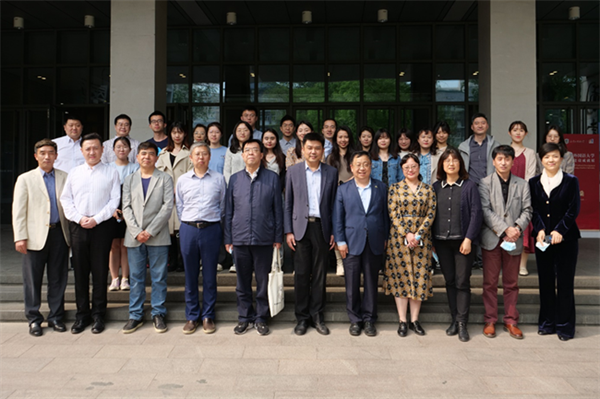- Research
- Research Centers
- Journals
- Admission
- Introduction
- Programs
- Application
- Alumni & Giving
- Alumni Club
- Giving
A symposium on the 10th anniversary of the Central and Eastern European Studies Centre at Beijing Foreign Studies University was held at BFSU on April 24.
It was followed by a news conference on the “Annual Report on the Development of Central and Eastern European Countries (2021).”
The events, conducted online and in person, were attended by experts and scholars from more than 10 higher education institutions and research organizations in China.

Zhao Gang (L), member of the standing committee of the CPC BFSU committee, vice-president of the university and director of the Central and Eastern European Studies Centre at BFSU, attends the news conference on the “Annual Report on the Development of Central and Eastern European Countries (2021)” on April 24. [Photo/bfsu.edu.cn]
Zhao Gang, member of the standing committee of the CPC BFSU committee, vice-president of the university and director of the center, said strengthening country and regional studies to comprehend the evolution of international situation is of key importance to the great rejuvenation of the Chinese nation.
Remarkable progress has been made in the cultivation of language talents and research masters in Central and Eastern European studies in recent years. BFSU should also push talent training to a new level, Zhao added.
Luo Lin, director of the Country and Regional Research Secretariat under the Ministry of Education (MOE), said colleges and universities have attached great significance to Central and Eastern European studies and played an irreplaceable role in boosting bilateral cooperation.
Luo also acknowledged BFSU’s contributions in national and regional research book publication as well as its academic influence in the field.
Wang Limin, president of the Social Sciences Academic Press (SSAP), congratulated the release of the annual report and said a comprehensive understanding of the differences and complexity of Central and Eastern European countries is the prerequisite for effective cooperation between China and the region.
As a high-end think tank for Central and Eastern European studies in China, the center at BFSU has given full play to its leading role in implementing the Belt and Road Initiative (BRI), Wang said.
The report accomplished by the School of European Languages and Cultures and the Central and Eastern European Studies Centre at BFSU presents the situation of politics, economy, society and culture in Central and Eastern European countries. It focuses on hot issues in the region, which helps readers grasp the new trends in international politics, according to Wang.
Wang Jianbin, executive deputy director of the Academy of Regional and Global Governance at BFSU, said the university has 37 regional and national research centers, four cultivation bases for individual countries and area studies registered with the MOE, and three MOE research centers for exchanges in humanities.
As a university with the most regional and national research institutions in China, BFSU will work closely with the MOE Country and Regional Research Secretariat and SSAP in blue book series development, he added.
Officials and research fellows from the Chinese Academy of International Trade and Economic Cooperation at the Ministry of Commerce; Russian, East European and Central Asian Studies at the Chinese Academy of Social Sciences; the Central and Eastern European Branch at the Chinese Association for European Studies gave keynote reports on economy and trade, politics, foreign relations, national security, as well as their cooperation with China.

Experts and scholars from more than 10 higher education institutions and research organizations attend the symposium on the 10th anniversary of the Central and Eastern European Studies Centre at BFSU on April 24. [Photo/bfsu.edu.cn]